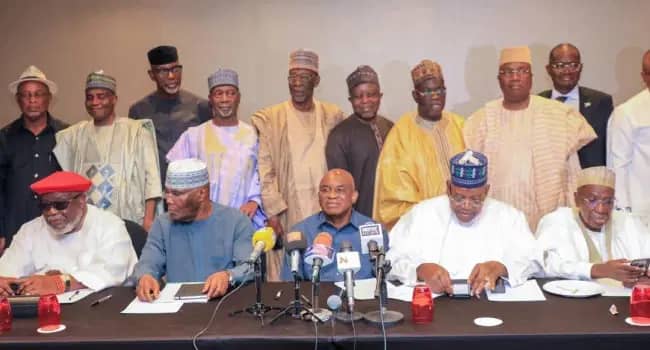Should Nigerians believe in the new political alliance?, by Pisheria James Kwaghe
Nigeria once again finds itself in familiar territory: the unveiling of yet another political alliance. Headlines trumpet unity, rebirth, and a so-called fresh start. Politicians from different camps are joining hands, declaring that they have listened to the people’s cries and are ready to deliver change. But behind the speeches and carefully staged displays of solidarity, one question remains: Should Nigerians truly believe in this new alliance?
To answer honestly, we must look beyond the glossy press conferences and examine the individuals driving this movement. What we see is less about renewal and more about repetition.
Most of the prominent figures now presenting themselves as champions of reform are the very politicians who helped bring Nigeria to its present state. They are not new voices. They are seasoned operators who have spent decades gaming the system, enriching themselves, and protecting a broken order.
READ ALSO: Are our leaders truly aware of the hardship we face?, by Amos Yohanna
Some once ruled as governors but left behind massive debts, unpaid wages, and crumbling infrastructure. Others held ministerial positions during eras of large-scale corruption, allowing public funds to vanish under their watch. Former legislators, among them, devoted more energy to inflating allowances than to passing reforms. Even ex-vice presidents are attempting to rebrand as elder statesmen, though they presided over periods of ethnic strife and missed opportunities.
These politicians have had multiple turns in leadership. They have occupied every possible role—local, state, and federal. They have switched loyalties repeatedly, moving from PDP to APC to new coalitions, not out of conviction but out of sheer ambition.
So the question is, what exactly is different this time? The banners may look new, the slogans may sound fresh, but the players are the same, and the storyline has hardly changed.
The history of alliances in Nigeria does not inspire confidence. In 2015, Nigerians placed their faith in a coalition that promised integrity, prosperity, and security. Citizens were assured of a new dawn. Yet what followed was disappointment: worsening insecurity, economic decline, and disunity within the coalition itself. The country bore the consequences of broken promises.
Now, many of the same actors from that era have resurfaced, taking centre stage once more. They insist they have learned lessons. But what tangible steps have they taken to earn back trust? Have they apologised for past failures? Have they returned stolen funds? Have they created space for fresh leaders, or are they still determined to dominate politics with outdated tactics?
The truth is clear: they have not reformed, only rebranded.
READ ALSO: Eighty years later, is the UN still fit for purpose?, by Timothy Ali Samuel
This coalition is not anchored on principle, vision, or a shared commitment to rebuilding Nigeria. It is an alliance of survival, cobbled together by political veterans sidelined in their old parties and desperate to remain relevant.
What binds them is not a genuine mission to serve the people but a fear of political irrelevance. Their sudden rediscovery of “love for the masses” conveniently coincides with approaching elections or loss of access to state resources.
Today, they speak the language of “youth inclusion,” “restructuring,” and “economic renewal.” Yet when they were in office, where were these ideals? During youth uprisings, how many stood in solidarity with young Nigerians? When bandits and terrorists ravaged communities, how many raised their voices with courage? During oil theft, subsidy scams, and electoral malpractice, how many of them took principled stands?
Nigeria requires leaders who have not been tainted by the rot of yesterday’s politics. Leaders motivated by moral conviction, not endless ambition. Leaders who form alliances not for self-preservation, but for a national purpose.
The Nigerian people must resist the urge to forget. We must not be dazzled by flashy speeches or manipulated by favourable media coverage. Our past experiences should serve as warnings. If we fail to remember, we will be trapped in the same cycle again.
This moment calls for scrutiny, not sentiment. Every politician in this coalition deserves examination. Every record must be revisited. The obligation to prove credibility rests squarely on them.
Citizens, on the other hand, must demand accountability, transparency, and honesty. Political performance must be measured against track records, not empty promises. After so much suffering, Nigerians cannot afford to confuse rhetoric with genuine leadership.
So, should Nigerians believe in the new alliance? Not if it is filled with the very architects of past failures. Not if it is motivated by convenience instead of conscience. Not if it reduces citizens to pawns in a relentless power struggle. Nigeria deserves genuine renewal, not recycled promises—and the people must insist on nothing less.
Pisheria James Kwaghe is a student of Mass Communication at the Muhammadu Buhari University of Maiduguri (formerly University of Maiduguri), Borno State.
Follow the Neptune Prime channel on WhatsApp:
Do you have breaking news, interview request, opinion, suggestion, or want your event covered? Email us at neptuneprime2233@gmail.com





